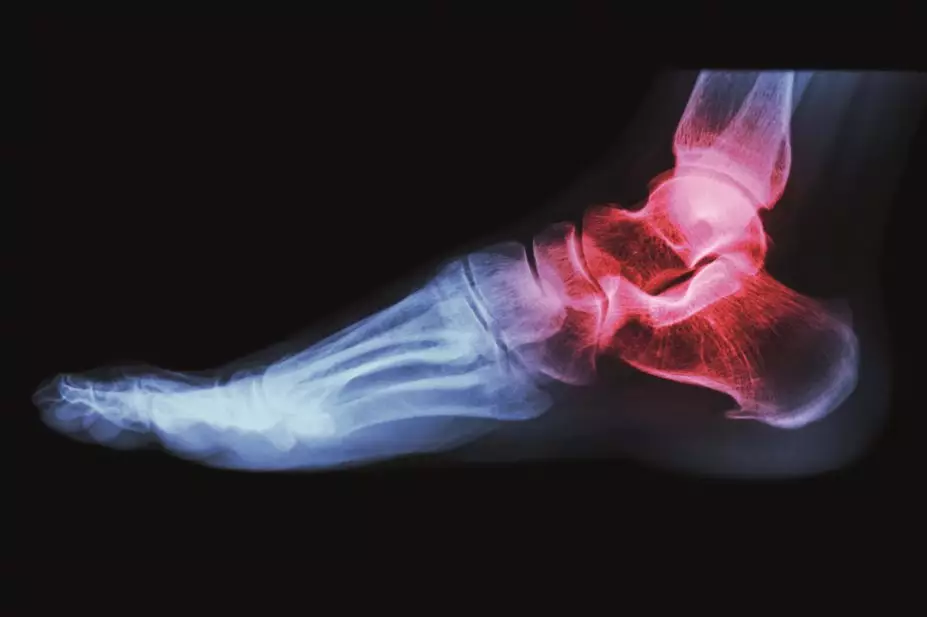
Puwadol Jaturawutthichai / Alamy Stock Photo
Rheumatoid arthritis patients who do not respond to treatment with biologic therapies may find relief in baricitinib, a new small molecule drug, according to the results of a phase III study published in The
New England Journal of Medicine
[1]
(online, 31 March 2016).
After 12 weeks of treatment, a 4mg daily dose of baricitinib led to a 20% improvement in disease for 55% of patients with moderate to severe disease, compared with 27% in the placebo-treated group (P<0.001).
Baricitinib is a Janus kinase (JAK) inhibitor and can be taken orally, unlike many biologic treatments, which have to be injected. Janus kinases form part of the signalling pathway involved in multiple parts of the autoimmune inflammatory response.
When patients with moderate to severe rheumatoid arthritis fail treatment with a disease-modifying anti-rheumatic drug (DMARD) such as methotrexate, the mainstay of treatment becomes injectable biologics.
However, the researchers, led by Mark Genovese, from Stanford University medical centre in California, say there is an unmet need for effective treatment of rheumatoid arthritis in patients who have inadequate disease control despite previous treatment with multiple biologic agents. “The number of such patients has been consistently increasing since biologic DMARDs first became available more than 15 years ago,” they say.
Patients enrolled in the study (n=527) had failed to show an adequate response to anti-tumour necrosis factor (TNF inhibitors) biologics, or other biologic therapies.
In the 12-week, randomised trial, patients were given a 4mg or 2mg dose of baricitinib or placebo. The primary endpoint was the proportion of patients who had an American College of Rheumatology 20% (ACR20) response at week 12. The ACR20 response is a reduction of 20% or more in the number of tender and swollen joints and an improvement of 20% or more in at least three other core measures, including pain, physical function and global assessment of disease.
At 12 weeks, as well as being significantly more effective in improving ACR20 score, baricitinib 4mg was associated with improvements in physical function and disease activity scores. Remission rates were not significantly higher than placebo initially, but did become significant at 24 weeks. At week 24, the percentage of serious adverse events was 7% in the placebo group, 4% in the 2mg group and 10% in the 4mg group. Infections were common in all three groups.
Stewart Glaspole, a clinical pharmacist and lecturer with a special interest in rheumatology at Brighton and Sussex University Hospitals NHS Trust, who was not involved in the study, says patients who fail to respond to biologics struggle to gain adequate response to subsequent therapies. “So having a medicine effective at this stage of the pathway is useful,” he says.
“Being the first oral agents to be developed for this stage of the disease, [JAK inhibitors] provide an alternative to injectable therapies that some patients may prefer.”
Baricitinib is being developed by Eli Lilly, which has four phase III trials of the drug under way. Glaspole says the efficacy of baricitinib directly compared with TNF-inhibitors, as well as established oral DMARDS, looks favourable. “However, some of these data are based on secondary endpoints and further work may be needed to confirm superior efficacy of barictitinib to established therapies,” he adds.
Another JAK inhibitor, tofacitinib, was approved by the US Food and Drug Administration in 2012. The drug is currently being evaluated for approval in the EU, after initially being refused a marketing authorisation by the European Medicines Agency in 2013.
Glaspole says that, given the cost of new therapies (tofacitinib costs around £16,000 compared with around £8,000-12,000 for a branded TNF-inhibitor) and the widespread implementation of more cost effective biosimilar agents, “we are yet to see what the impact of the oral JAK inhibitors will be”.
- This article was amended on 6 April 2016 to clarify that tofacitinib was approved by the US Food and Drug Administration in 2012, not 2010 as originally stated.
References
[1] Genovese MC, Kremer J, Zamani O et al. Baricitinib in patients with refractory rheumatoid arthritis. New England Journal of Medicine 2016. doi: 10.1056/NEJMoa1507247
You may also be interested in
The importance of diverse clinical imagery within health education

Entrustable professional activities: a new approach to supervising trainee pharmacists on clinical placements
